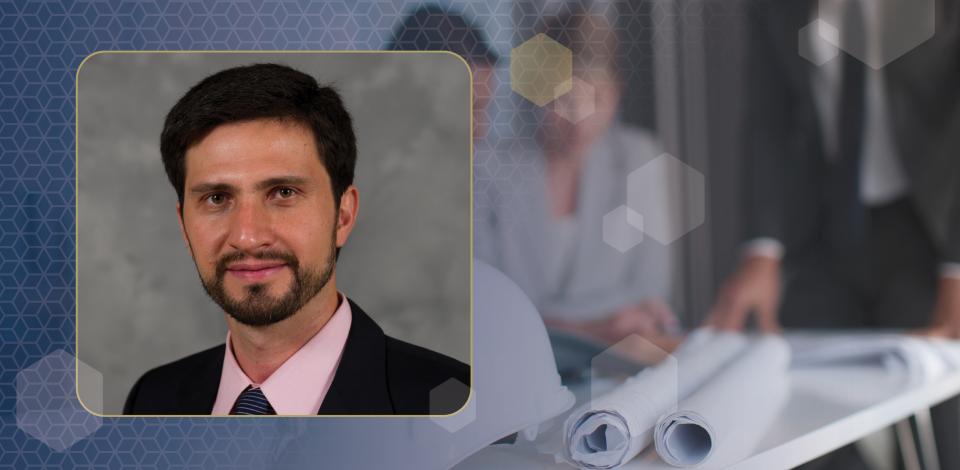New Academic Director for Professional Master’s in Occupational Safety and Health
Baabak Ashuri, Ph.D., named the academic leader of the program

Georgia Tech Professional Education (GTPE) has appointed Baabak Ashuri, Ph.D., DBIA as academic director of the Professional Master’s in Occupational Safety and Health (PMOSH). Dr. Ashuri is a Professor in Schools of Building Construction and Civil & Environmental Engineering.
The recent pandemic has reiterated the importance of health and safety professionals across organizations both big and small. “The PMOSH program uniquely balances fundamental concepts with practical applications,” said Ece Erdogmus, Ph.D., professor and chair, School of Building Construction. “Baabak has been an integral part of the program, with his involvement in its creation and ongoing as an active faculty member. Students continuously comment that while his classes are very challenging, he does a great job explaining difficult concepts and answering their questions.”
“Baabak’s passion for the student is obvious and contagious,” said Nelson Baker, dean of professional education. “He also brings a wealth of expertise, research, and insights and his leadership will be instrumental as this program continues to look toward growth.”
As academic director of PMOSH, Dr. Ashuri will work to increase the program's national visibility while seeking opportunities to strengthen the ties between PMOSH and the other aligned degrees, programs and activities across the Institute.
In a recent interview, he shared his views on the program and his role as academic director.
What originally led you to a career focused on this area?
My background is in systems engineering, focused on economic decision analysis and risk management. Occupational safety and health provide a rich context to apply systems thinking principles and analytics methods. Safety issues are rooted in problems from various disciplines requiring coordinated efforts among professionals from different backgrounds. This means that safety problems need to be studied from a systems perspective. I’ve found the systems engineering methods that I learned in my academic study are valuable in addressing occupational safety and health issues. For example, qualitative and quantitative risk assessment and engineering economic analysis are powerful methods to analyze accidents to find their root causes and develop appropriate risk management strategies to improve workplace conditions.
What is your message to current and prospective PMOSH students? What would you like them to know about the program and about you?
There is no better time to join the occupational safety and health industry. Coming out of the long-tailed pandemic, businesses from all backgrounds clearly understand the significant value of providing healthy and safe workplaces for their employees, clients, and visitors. Business continuity is a top strategic goal for all businesses to prepare for the next big thing that the world throws at them. And safety professionals will remain front and center in working with organizational executives to set forth effective strategies to enhance business operations' quality, safety, and productivity during normal and turbulent times.
The PMOSH program is strongly committed to developing safety professionals with exceptional skills in leadership, business operations, and project management. Our graduates are industry leaders and assets for public and private organizations to prevent workplace injuries, illness, and fatalities, thereby elevating the organizational image.
In simple words, PMOSH graduates are the best advocates for the health, safety, and well-being of employees. PMOSH graduates are well-positioned to engage, educate, and influence government agencies and private enterprises in making more informed decisions about safety policies and implementing best practices.
How do you see this program supporting the future industry workforce and its leaders?
PMOSH graduates are fully prepared to lead public, private, and nonprofit organizations of all sizes in their mission to elevate their reputation in social responsibility. Providing a safe and pleasant workplace is critical to the success of any business, but most importantly, it is the right thing to do. PMOSH trains the next generation of leaders who add significant value to organizations by mitigating occupational hazards, improving productivity, increasing employee satisfaction, attracting new employees, retaining existing employees, and improving the image of the organization.
What industry challenges do you see in this current environment, and how can PMOSH students help solve them?
We live in a time of uncertainty on all fronts. The industry needs great leaders to ensure smooth and safe operations under any external conditions. There is a rising demand from businesses to show their commitment to not just the safety and health of their employees, but also employee mental health, well-being, and work-life balance. PMOSH students are uniquely prepared to lead businesses in placing people at the center of designing safe and mindful workplaces.
Businesses strive to improve their positions in the constantly changing world with rising expectations to show a commitment to sustainability and equity. PMOSH graduates are well-equipped to make a business case for safety enhancement in their organizations. They are central in assisting public and private organizations in fulfilling their environmental, social, and governance (ESG) commitments.
What are you most excited about moving forward as academic director of PMOSH? What do you see as the future of the program?
Students. Knowing that we can have an impact on the life and career of these great professionals provides me with absolute joy and a sense of fulfillment. PMOSH students are dedicated, hard-working, passionate, and focused on the mission of providing a safe and sound workplace for everybody. Helping PMOSH students to advance in their careers is my top priority as PMOSH's academic director. The future is bright for our graduates as more businesses show their strong commitment to social responsibility and find a great return on investment in creating a safe work environment.

